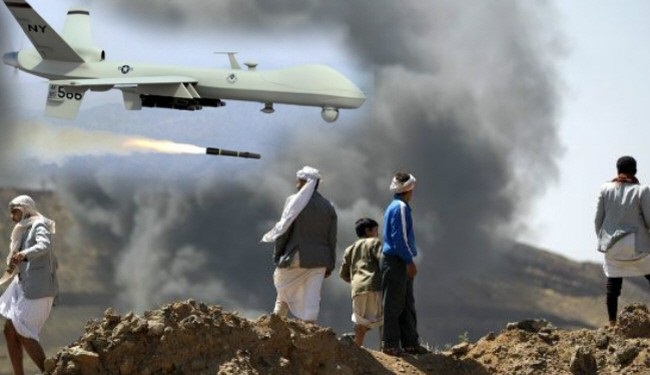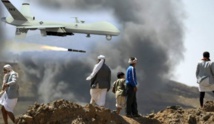The Pentagon said the past two days had seen it carry out "somewhere over 30" strikes against Al-Qaeda in the Arabian Peninsula (AQAP), conducted in partnership with the Yemeni government. "This is part of a plan to go after this very real threat and ensure that they are defeated and denied the opportunity to plot and carry out terrorist attacks from ungoverned spaces," Pentagon spokesman Navy Captain Jeff Davis said, noting America would continue to attack AQAP.
"While we talk a lot about ISIS (the Islamic State group), AQAP is the organisation that has more American blood on its hands," Davis said.
The increased bombing comes a little more than a month after a botched American raid against AQAP left multiple civilians and a US Navy SEAL dead.
The January 29 raid was the first authorised by President Donald Trump, and he drew criticism after he blamed "the generals" for having "lost" Navy SEAL Ryan Owens.
Al-Qaeda has exploited a power vacuum created by two years of war between Yemen's government and Shiite rebels who control the capital to consolidate its presence, particularly in the south and east.
AQAP has published 16 issues of an online magazine called "Inspire" urging individuals to attack the West.
The group has about 2,000 to 3,000 members, a US defence official said.
Friday's attacks hit similar targets as on Thursday -- including weapons caches, fighters and military equipment.
According to Yemeni officials, at least 12 suspected militants were killed in Thursday's strikes.
On Friday, US warplanes hit three houses in the Yashbam Valley before dawn, one of them the home of Al-Qaeda's Shabwa province commander Saad Atef, tribal sources said.
Security officials in the area said eight jihadists were killed, and tribal sources said that women and children were wounded.
That would bring the total jihadist death toll to at least 20 over the two days.
Jihadists retaliated with anti-aircraft fire, security officials and tribal sources said, adding that US helicopters took part in the operation.
One resident said it had been a "terrifying night".
US officials say Thursday's strikes were focused on the southern provinces of Shabwa and Abyan and the central province of Baida.
The United States periodically sends small teams of commandos into Yemen, primarily to gather intel, but Davis said no Americans had been involved in any ground combat operations as part of the strikes.
Trump gave US Defence Secretary Jim Mattis and the military's Central Command authority to conduct the January 29 raid and subsequent attacks, but Davis said the targets struck Thursday and Friday had been developed long before the raid.
As many as eight women and eight children were killed, a Baida provincial official said, drawing condemnation of the raid from human rights groups.
The defence official said the raid had yielded "potentially actionable" intelligence including an "awful lot" of phone numbers and contact details that will help analysts understand connections within the group.
This week's strikes were conducted through "manned and unmanned" means, and Davis did not rule out that US ships in the region had also been involved.
Successive American administrations have kept up a drone war against Al-Qaeda in Yemen since soon after the September 11, 2001 attacks.
Washington regards the Yemen branch to be the jihadists' most dangerous, and holds it responsible for several plots to stage attacks in the West.
"While we talk a lot about ISIS (the Islamic State group), AQAP is the organisation that has more American blood on its hands," Davis said.
The increased bombing comes a little more than a month after a botched American raid against AQAP left multiple civilians and a US Navy SEAL dead.
The January 29 raid was the first authorised by President Donald Trump, and he drew criticism after he blamed "the generals" for having "lost" Navy SEAL Ryan Owens.
Al-Qaeda has exploited a power vacuum created by two years of war between Yemen's government and Shiite rebels who control the capital to consolidate its presence, particularly in the south and east.
AQAP has published 16 issues of an online magazine called "Inspire" urging individuals to attack the West.
The group has about 2,000 to 3,000 members, a US defence official said.
Friday's attacks hit similar targets as on Thursday -- including weapons caches, fighters and military equipment.
According to Yemeni officials, at least 12 suspected militants were killed in Thursday's strikes.
On Friday, US warplanes hit three houses in the Yashbam Valley before dawn, one of them the home of Al-Qaeda's Shabwa province commander Saad Atef, tribal sources said.
- A 'terrifying night' -
Security officials in the area said eight jihadists were killed, and tribal sources said that women and children were wounded.
That would bring the total jihadist death toll to at least 20 over the two days.
Jihadists retaliated with anti-aircraft fire, security officials and tribal sources said, adding that US helicopters took part in the operation.
One resident said it had been a "terrifying night".
US officials say Thursday's strikes were focused on the southern provinces of Shabwa and Abyan and the central province of Baida.
The United States periodically sends small teams of commandos into Yemen, primarily to gather intel, but Davis said no Americans had been involved in any ground combat operations as part of the strikes.
Trump gave US Defence Secretary Jim Mattis and the military's Central Command authority to conduct the January 29 raid and subsequent attacks, but Davis said the targets struck Thursday and Friday had been developed long before the raid.
As many as eight women and eight children were killed, a Baida provincial official said, drawing condemnation of the raid from human rights groups.
The defence official said the raid had yielded "potentially actionable" intelligence including an "awful lot" of phone numbers and contact details that will help analysts understand connections within the group.
This week's strikes were conducted through "manned and unmanned" means, and Davis did not rule out that US ships in the region had also been involved.
Successive American administrations have kept up a drone war against Al-Qaeda in Yemen since soon after the September 11, 2001 attacks.
Washington regards the Yemen branch to be the jihadists' most dangerous, and holds it responsible for several plots to stage attacks in the West.









 Home
Home Politics
Politics











